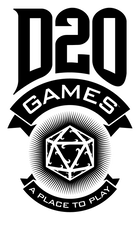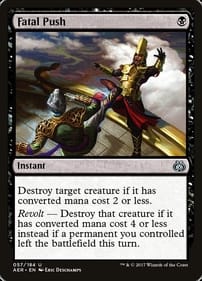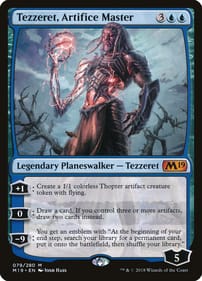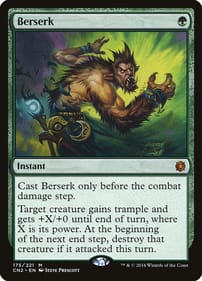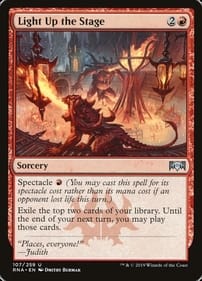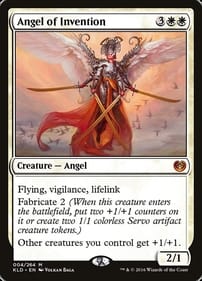Description
Modern Horizons 2 is the second Magic set to skip Standard legality and aim straight for Modern. Inside are new-to-Modern cards, with a mix of new cards and reprints that will become Modern-legal for the first time.
Every Modern Horizons 2 Collector Booster will include four rare or mythic rare cards. Included in the Collector Booster will be three foil-etched cards (one of which is always a foil-etched basic land), nine traditional foils, a foil double-sided token, and three non-foil cards. There are 153 unique foil-etched cards that can be found inside the Collector Booster. This includes ten basic lands, select cards from the original Modern Horizons, and retro frame and new-to-Modern cards from Modern Horizons 2 (including enemy fetch lands).
https://magic.wizards.com/en/articles/archive/feature/booster-fun-modern-horizons-2-2021-05-21
MODERN HORIZON 2 CARD TREATMENTS
For a design concept that encompasses the history of Magic, you can imagine there were a lot of potential ideas for card treatments in Modern Horizons 2. These were whittled down to a few that fit in well with the Modern Horizons 2 theme and let us show off Magic artwork that we love in new ways.
TRADITIONAL FOIL AND FOIL-ETCHED TREATMENTS
The traditional foil card treatment has been a part of Magic: The Gathering for many years. Though the foiling process has varied during that time, foil cards have remained a staple of pack-cracking fun for a while.
In late 2020, Commander Legends introduced players to the foil-etched card treatment with a new kind of visual wow factor. The foiling process is similar to traditional foiling with a few variations, and the imaging and typesetting processes take a little longer to complete.
For Modern Horizons 2, there are 153 foil-etched cards to be discovered in Collector Booster packs, including basic lands, new-to-Modern reprints, retro frame cards, and Modern Horizons cards with the retro frame treatment. The combination of traditional foil and foil-etched treatments with the new frames opens new dimensions to explore in visual quality, coolness, and collectability.
Before we move on to the next treatment, take a look at this foil-etched basic land and foil-etched retro frame Rishadan Dockhand:
BORDERLESS AND EXTENDED-ART TREATMENTS
Borderless cards are a perpetual fan favorite—and why not? Magic alternate artwork is stunning, and there's an electric charge you get when you open a pack and find this big, beautiful artwork spilling out of bounds on a card that makes your palms sweat with its potential.
Consider for a moment the versatile, the humble, Counterspell:
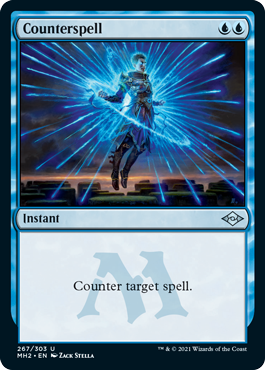
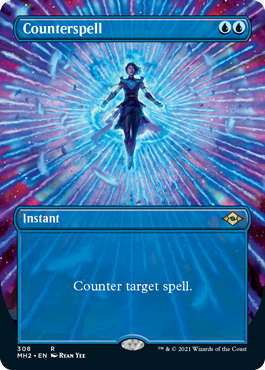
Who are we kidding? Humility is not in this card's vocabulary!
"Borderless card art allows the art to be more immersive and front and center," said Cynthia. "Artists have more room and larger dimensions to work with than normal, allowing them to do tricks they couldn't typically do with the standard frame."
Extended-art card treatments similarly defy the traditional frame limits of regular Magic cards, pushing out horizontally to grant players a glimpse at more of an artist's work. Modern Horizons 2 features extended-art treatments on rares and mythic rares that don't have another treatment version already.
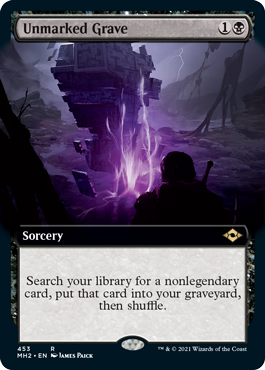
Different card treatments allow the team to branch out into new styles and dip into the continually expanding pool of artists for talent. They can tap an artist who has shown their skill for a type of card subject, such as landscapes, characters, or abstract magic, for example. "Or, we can go with one of the stylized artists that can hit the thematic creative look we're going for," said Cynthia.
SHOWCASE RETRO FRAME TREATMENTS
Nostalgia is a prominent theme in Modern Horizons 2, and no card treatment hits that note better than the retro frame treatment. For this set, the team reached back to pluck elements that really convey that sense of history.
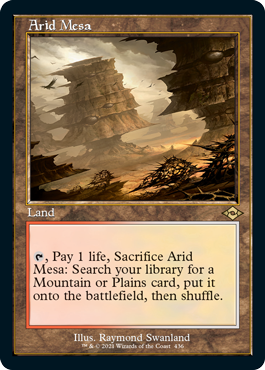
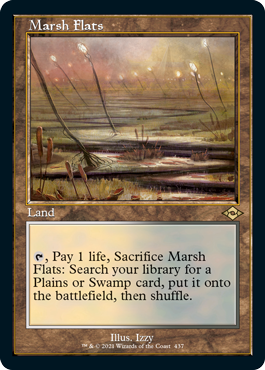
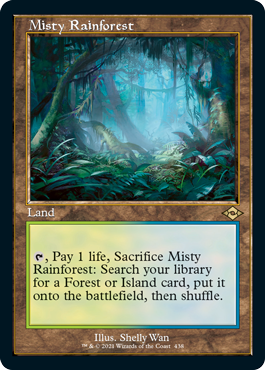
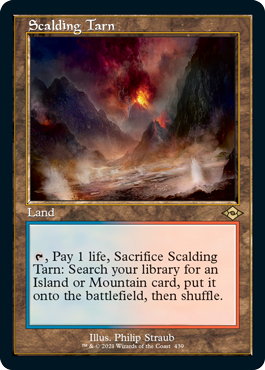
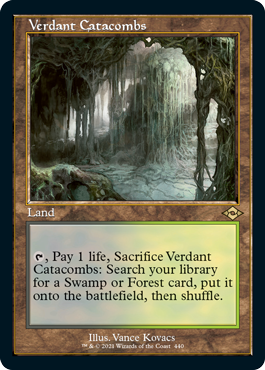
Retro artwork is from a different era, so bringing it forward for a modern set had its challenges.
"Magic frames have come a long way from the retro stylings," said Daniel. "Trying to shove things back into that box can be troublesome."
Traditional foil retro frame cards also presented an interesting twist when dealing with older cards. During the foiling process, there is what's called a white under-print plate, or simply a WUP. Specific elements of the card are under-printed with different values of white ink to create the visual textures within the frame and illustration. In the early days of Magic, we didn't have custom WUP treatments for artwork, so on traditional foil retro frame cards, the foil effects don't show inside the art box itself. (Foil-etched treatment will be visible over the entire frame and art of the card for foil-etched retro frame cards.)
(If you want to learn more about this process, check out Tom Wänerstrand's article on how we build cards.)
Players with long Magic memories will find another nostalgic nugget in these treatments, too. "We got to add some callbacks to the classic frame template," said Daniel, "including a tombstone symbol in the upper left for cards that have effects while in the graveyard."
There are 61 showcase retro frame cards spanning all rarities in Modern Horizons 2, including the aforementioned fetch lands. There is also a group of original Modern Horizons cards that get retro frame treatments, which you can only find in Collector Boosters.
Non-foil retro frame cards can be found in Draft and Set Boosters. Traditional foil versions have a chance to show up in any of the booster types, while the foil-etched versions will be exclusive to Collector Boosters.
SHOWCASE SKETCH TREATMENTS
Art creation for Magic is an iterative process. Generally, an artist receives a brief on what a particular Magic card is about or how it might visually be represented. The artist then creates a sketch of their vision and shares it with the team. The collaboration continues until a final work is complete.
The early artistic work in the process can be fascinating, especially when compared to the final result, and it seemed a shame that players don't get to experience this.
Enter the showcase sketch treatment.
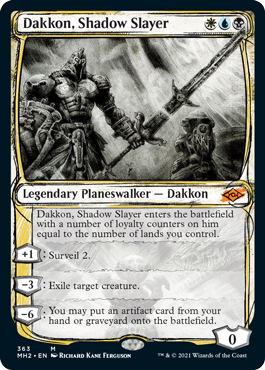
There are 54 cards with showcase sketch treatments in Modern Horizons 2. "We wanted these to celebrate the abundance of variety and diverse ways our artists work," said Cynthia Sheppard. "Through the course of working with an artist, art directors get really good at interpreting what the final is going to look like based on the sketch. But it's something that's usually invisible to players, and we thought it would be an awesome opportunity to pull back the curtain and show that diversity."
"A cool thing we did for Modern Horizons 2," said Mike Turian, "was we let the artists know that each of the cards could be chosen for the sketch treatment." With these in hand, the team narrowed the choices down to find great examples that illustrate the progress from the sketch phase to the final product.
The term "sketch" can cover quite a range of artistic approaches. "There are many, many ways to create an illustration," said Cynthia. "Each artist has their own process, and sketches look wildly different from each other. For example, some artists work up a rough draft in color, or create a monochromatic value sketch, which looks kind of like a finished painting in black and white, while others do more traditional pencil sketches. Some use toned surface, others use white paper . . . it varies so much that the biggest challenge for the frame was getting it to work with all these different executions.
"We wanted to make sure that when we did sketch cards, we did them in a set where they could be collected along with their finished counterparts. Modern Horizons 2 gave us that opportunity."

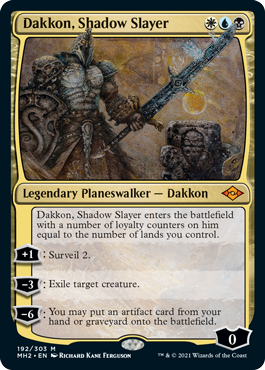
Certain sketch cards have another cool behind-the-scenes detail: actual text given to the artist as guidance on the action, mood, or intent of the card. For example, an intent could be, "The spell shows a creature being damaged by powerful rays of light," or a mood might say simply, "A friendship that can outlast death." These give an artist a place to start without being overly prescriptive or limiting to creativity.
Sketch card treatments aren't just for players; they hold meaning for team members, too. "What made them special for me," said James Arnold, "was that they would go on to house the art of Richard Kane Ferguson and Drew Tucker. Both of these legends are good friends and mentors of mine and have been absolutely critical in helping shape my journey as an artist. I look up to them and deeply admire their work. The fact that I could make something special to pay tribute to their creative process and have a direct collaborative effort within the game that brought us together in the first place."
"What else could you ask for?"
WHERE CAN I FIND THESE TREATMENTS?
Payment & Security
Your payment information is processed securely. We do not store credit card details nor have access to your credit card information.
